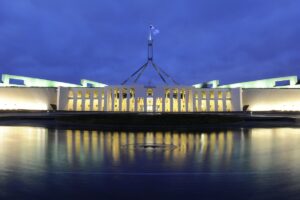
Treasurer Jim Chalmers presented the Labor governments 2023-24 budget last night. At the heart of the budget, the low-income earners of Australia were earmarked as there was a focus on the cost of living crisis and rental relief to help the impact of inflation.
The key losers of this budget is the smoking and e-cigarette industry. Smokers will see the tobacco excise increase by 5% each year for three years. Disposable vapes will be banned and heavily regulated unless a valid prescription is acquired.
An underlying cash surplus of $4.2 billion is now forecast for 2022-23. However, that surplus is set to disappear in 2024.
Keep reading as we dive into a short sharp recap of the main changes that may impact your small business and everyday living.
Key Takeaways
The 2023 Australian Federal Budget includes measures aimed at improving the lives of Australians. Inflation is projected to fall back to the range between 2 and 3% from mid-2024 and wages are set to rise early next year by 4%. These include increased funding for mental health, disability, domestic violence, and homelessness services, as well as support for Aboriginal and Torres Strait Islander people.
Mental health, disability, domestic violence and homelessness services will receive $4 billion in additional funding in the coming four years. The Labor government has pledged $1.9 billion to be invested over five years to increase the lives and economic opportunities of Aboriginal and Torres Strait islander people.
The government has also committed to increasing payments for those on Jobseeker, Austudy, and Youth Allowance. 1.1 million Australians on Jobseeker, Austudy and Youth Allowance will receive an increased payment by $40 per fortnight. Other initiatives include a projected fall in inflation and a 4% increase in wages.
What Small to Medium Business Owners Should Know

- The PAYG and GST uplift factor which determines the amount of tax instalments will be set at 6% instead of 12%
- Full expensing of assets continues after 30 June 2023 but only for assets that cost less than $20,000. This will apply only for the year ending 30 June 2024. After that (currently) the expenditure threshold will return to $1,000.
Individuals
- No changes to rates
- Increase in the Medicare Levy threshold for low-income earners
Superannuation
- From July 2026 employers will be required to pay super at payday, rather than quarterly
- Additional 15% tax on individual superannuation balances that exceed $3 million (commences 1 July 2025).
Tax Administration Measures
- Extra money assigned to ATO to increase administration efficiencies and collect GST, with the creation of five new tax clinics
- Aims to help lower burden on small businesses to help them meet tax and superannuation liabilities
- From 1 July 2024, small businesses will be able to authorise their tax agent to lodge multiple Single Touch Payroll forms for them
- From 1 July 2025, small businesses will have up to 4 years to amend their income tax returns
Electricity and Energy Relief
- Up to $650 of energy bill relief will be paid to small businesses, as the government seeks to neutralise price rises for this year and 2024
- Small businesses will be able to to claim 20% of spending that supports electrification or more efficient energy use on their taxes
Cyber Security
- $23.4 million was pledged to support small businesses to build resilience to cyber threats.
International Students
- Tightened restrictions to working hours for international students, now capped to 48hours per fortnight (students working in Aged Care facilities are exempt)
Who took the biggest losses?
Truckies, smokers, vapers, and new migrants are amongst the losers for this years budget.
As part of the 2023 Australian federal budget, the heavy vehicle road user charge will increase by 6% per year for the next three years, reaching 32.4 cents per litre of diesel by 2025-26. This charge is usually allocated towards road maintenance and repairs. The government expects to save $1.1 billion over four years by reducing the cost of the fuel tax credit.
The Australian government has announced that disposable vapes will be banned, and others will be heavily regulated, only accessible through pharmacies with a prescription. This move aims to reduce the number of people who use vapes and prevent young people from taking up the habit. The government will spend $234 million over four years on public health campaigns and support programs to help Australians quit vaping, as well as an additional $140 million to extend the Tackling Indigenous Smoking program. In line with this policy and to further tackle nicotine addiction, the tobacco excise will be increased by 5% each year for three years.
Lastly for those wanting to migrate to Australia, the cost of visa applications will be raised by 6%. This will generate an additional $660 million for the government. It will be used to improve visa processing times and reduce immigration backlogs. Additionally, Working holiday visas and other short-stay visas will see a 21% increase in cost.
Other areas affected
The Australian 2021-2022 Federal Budget has introduced several initiatives and funding measures to support Australians in various areas. In childcare, families earning less than $80,000 will now receive a subsidy increase of 90%. The government has also lifted the cut-off age for single parenting payment from 8 to 14 years old, meaning parents will receive an additional $176.90 a fortnight if they are on the base rate.
Additionally, hundreds of medications listed on the Pharmaceutical Benefits Scheme will have their costs effectively halved, including common medicine for type 2 diabetes, depression, and reflux. To support better access to medical care, doctors are being incentivised to increase bulk-billing, particularly for children under 16, pensioners, and other Commonwealth concession card holders.
The government has also invested $2.7 billion to increase rent assistance by 15%, providing an extra $24 per fortnight to 1.5 million renters.
The aged care sector will receive a $11.3 billion investment for a historic wage increase, with registered nurses receiving a pay increase of up to $10,000 a year and enrolled nurses up to $7,500 a year. These measures will help improve the quality of care for elderly Australians and increase the pay and recognition of aged care workers.
Overall, the 2023 Australian Federal Budget’s main focus is the cost of living crisis. The projected fall in inflation and rise in wages will also provide much-needed financial relief to Australians struggling with the impact of inflation.
If you have any questions, please contact our team. We are here to help:
(03) 9374 8400
hello@mksgroup.com.au
Read More Blogs
Accurate Logbook & Odometer Readings: Essential for FBT Compliance
As the end of March approaches, so does the conclusion of the Fringe Benefits Tax…
Unlocking Success: The Benefits of Coaching for Small Business Owners
Understanding Your Minimum Repayment Obligations
6 Tips for Small Business Owners Preparing for the Christmas period
Everything You Need to Know About Your Work From Home Deductions
If you worked from home during the 2024 financial year, this blog is for you!…
3 Ways to Reduce Business Expenses Without Sacrificing Quality
In the dynamic world of small business, maintaining a lean operation without compromising on quality…







